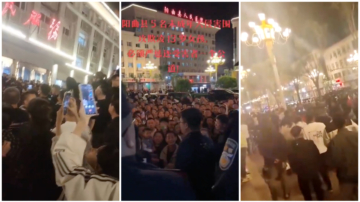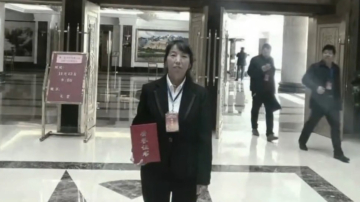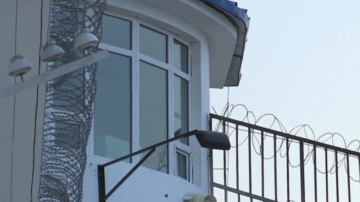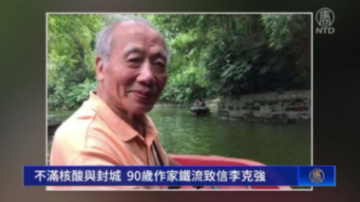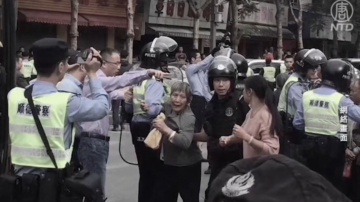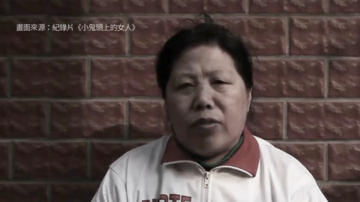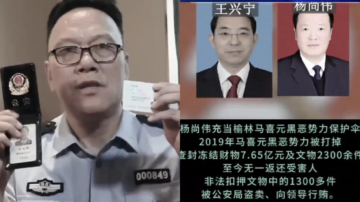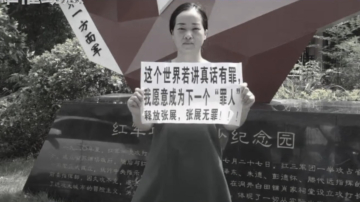【新唐人2013年11月04日訊】廣東省新聞出版廣電局就「陳永洲事件」對《新快報》作出查處決定後,作為母報的《羊城晚報》集團,立即對《新快報》展開「大換血」,不但《新快報》社長、總編、副總編全部遭到免職,其他班子成員也被部分調整。此外,廣電局還要求全省媒體以此為戒。業界人士擔心,中共當局會藉機打壓「不聽話」的《南方》報系,甚至「清洗」全國新聞界。
《羊城晚報》集團11月 1號發出通告,免去《新快報》社長兼總編輯李宜航,和副總編輯馬東瑾兩人職務,由《羊城晚報》報業集團黨委書記劉紅兵兼任《新快報》社長,《羊城晚報》社委孫璇則兼任《新快報》總編輯,《羊城晚報》要聞部副主任陶勇兼任副總編輯。
在此之前,廣東省新聞出版廣電局和省新聞工作者協會聯合發出通知,要求全省媒體對《新快報》記者陳永洲一事引以為戒,堅決處理和舉報所謂虛假報導、有償新聞和新聞敲詐等行為。
《新快報》遭到如此「大換血」,以及,廣東當局對這一事件的「嚴厲」態度,使得廣東新聞界一時間風聲鶴唳,集體噤聲。有媒體人士分析,當局極有可能借《新快報》事件,全面整肅《南方》報系,甚至全國新聞界中的所謂「異己分子」。
原《大公報》《大週刊》主筆兼新聞部主任朱健國:「這次弄《新快報》,不是為了《新快報》,也不是為了抓那個記者,它是製造一個突破口,尋找一個理由、一個契機來全面的整肅《南方》報系。廣東的媒體一直要比內地的媒體敢於說話,那麼現在北京要重新收緊,要搞一言堂,禁止自由報導,那麼就要從廣東先開刀。」
巧合的是,就在陳永洲被跨省刑拘的前幾天,中共國家新聞出版廣電總局宣佈,全國25萬名新聞採編人員,將在明年初統一換發新版的新聞記者證。記者必須接受為期一個半月的「崗位培訓和考核」,考核合格才能獲得新記者證。而「培訓」內容包括﹕「中國特色社會主義」、「馬克思主義新聞觀」、以及增進記者對「國家大政方針的認同」等內容。當局這一規定又被輿論稱為「國考洗腦」。
網民紛紛譴責中共企圖「清理」意識形態,和控制新聞媒體的輿論導向。
朱健國:「這個不是它廣東要做的,這是北京早已部署的一個戰略任務。全國25萬記者全部要更換記者證,那麼就是全國的記者都要來個大清洗、大換血。把那些不信『共產主義』,不願回到馬列這條軌道上的人都要清洗出去,它就是這麼一種趨勢。」
「南方報系」,最早是對《南方週末》、《南方都市報》、《21世紀經濟報導》、《21世紀環球報導》、《新京報》等南方報業旗下刊物的總稱,後來部分人士將《羊城晚報》、《蘋果日報》等媒體也加入其中。
因為敢言,「南方報系」又被孔慶東、方舟子及毛左們批為「漢奸媒體」、「反動媒體」,十多年來遭到當局近20次的整肅,期間多個刊物遭停刊或是被剝離,多名記者、總編被降職、免職甚至判刑。包括﹕2003年總編輯程益中因率先曝光SARS疫情,被降職處理﹔2004年1月,總經理喻華峰、編輯程益中等四人,被廣州執法部門以經濟犯罪之名逮捕判刑﹔今年1月,《南方週末》新年獻詞遭竄改,引發軒然大波等。
大陸媒體人曾感嘆,中國媒體生態的艱難險惡只有身在其中才能體會,要麼就「顧全大局」、掩耳盜鈴,掩蓋一切真相﹔要麼就出賣新聞良知做虛假報導。即使有看似正義反腐的報導,也是高層權鬥操控下的產物。總之,媒體人想真正報導真相、或起到新聞監督的作用,一定會備受打壓甚至付出慘重代價。
採訪/ 易如 編輯/ 張天宇 後製/葛雷
Nationwide Media Cleanup Possible As Xin Kuai Bao’s
Old Leaders Dismissed
Guangdong Provincial Administration of Press, Publication,
Radio, Film and Television (APPRFT) announced its intention
to punish the Xin Kuai Bao over Chen Yongzhou’s incident.
The newspaper’s parent company Yangcheng Evening News
Group immediately made big changes to the Xin Kuai Bao’s leading heads.
Not only were the editor-in-chief and vice editor-in-chief
dismissed, personnel adjustments were also made
to other positions inside the newspaper.
Guangdong’s APPRFT also called on all its media
organizations to “learn the lesson” from the incident.
Insiders now worry that the Chinese Communist party (CCP)
will take the opportunity to suppress Southern Newspaper Group,
or even the whole media industry in China.
On November 1st, the Yangcheng Evening News Group
announced that the Xin Kuai Bao’s president and editor-
in-chief Li Yihang together with vice editor-in-chief Ma
Dongjin were removed from their posts.
Liu Hongbing, the party secretary of the News Group will
concurrently work as the new president.
Sun Xuan, a committee member of Yangcheng Evening News
Board, will take the concurrent role of the editor-in-chief.
Tao Yong, the vice director of Yangcheng Evening News’
Top-News Department, will concurrently work as
the new vice editor-in-chief.
Right before that, Guangdong’s APPRFT and Provincial All
Journalists Association made a joint announcement.
They require all media organizations in Guangdong to learn
the lesson from Chen Yongzhou’s incident and step up
efforts against fabrication, paid news and blackmailing.
The dismissal of the Xin Kuai Bao’s leaders and local CCP
harsh attitude toward the incident has already generated a
chilling effect over all media in Guangdong.
Some media workers speculate the CCP will probably have an
all-round crackdown on Southern Newspaper Media Group.
This suppression may be even extended against
all “dissidents” among China’s media.
Zhu Jianguo, former news director at Hong Kong-based
Ta Kung Pao: “The suppression over the Xin Kuai Bao is
not only to punish the newspaper or that journalist.
Indeed the CCP is trying to find a chance or an excuse to
start an overall crackdown on Southern Newspaper Group.
The media in Guangdong is always braver in speaking than
inland media.
Now the party leaders in Beijing want to tighten the control
over free reporting leaving only its own voice to be heard.
So it chooses Guangdong’s media as the first target.”
Coincidentally, just several days before Chen Yongzhou
was arrested, the CCP’s State APPRFT announced that all
250,000 Chinese reporters would be issued a new press
pass in early 2014.
To get the pass, reporters have to attend a half-month of
“journalists’ professional trainings” passing a qualifying exam.
The training contents include subjects such as “Socialism
with Chinese Characteristics”, “Marxist View of Journalism”,
“Journalism Ethics”, as well as materials aiming at improving
reporters’ “ideological identity” with the party’s policies.
It is being called a “brainwashing national exam”
by media workers.
Many Chinese netizens have criticized the CCP’s attempt at
cleaning up different ideologies and controlling the “main
direction” of media reports.
Zhu Jianguo:”It is not Guangdong’s authority that
makes the commands.
This is a strategic task given by Beijing long time ago.
All 250,000 reporters in China have to renew
their press passes.
This is simply a large-scale cleanup of all Chinese journalists.
Those who don’t believe in Communism or return to
the track of Marxism will be eliminated.
That is what the CCP plans to do.”
Originally, the Southern Newspaper Group was a general
name for Southern Weekly, Southern Metropolis Daily,
21st Century Business Herald, 21st Century World Herald
and Beijing News.
They are all attached to Sourthern Newspaper Media Group.
Later some also included Yangcheng Evening News
and Apple Daily into this group.
Because of its daring to speak up, the Southern Newspaper
Group is called “Traitor Media” or “Reactionary Media” by
leftists such as Kong Qingdong and Fang Zhouzi.
It has suffered political cleanup almost 20 times over
the past ten years.
During this period many publications were forcibly closed
down or detached from the group.
Quite a few journalists and editors-in-chief were downgraded,
fired or even convicted.
Examples are: editor-in-chief Cheng Yizhong was downgraded
as he first revealed the outbreak of SARS in 2003.
Cheng Yizhong, a general manager Yu Huafeng and two others
were arrested and convicted in January 2004 on charges
of economic crimes.
In January 2013, Southern Weekly’s New Year special editorial
was changed by the propaganda department.
This made a big dispute.
Some Chinese media workers always say that, you can only
learn how bad Chinese media environment by working there.
You have to “consider the overall situation” and hide the
truth by deceiving yourself, or make false reports which
betrays your professional conscience.
Even those apparent justice reports of anti-corruption are
only products of power-struggles among the party leaders.
Anyone who wants to report real news or act as media
supervisor of the society will definitely be suppressed.
They may even have to pay a heavier price
in many cases.
《羊城晚報》集團11月 1號發出通告,免去《新快報》社長兼總編輯李宜航,和副總編輯馬東瑾兩人職務,由《羊城晚報》報業集團黨委書記劉紅兵兼任《新快報》社長,《羊城晚報》社委孫璇則兼任《新快報》總編輯,《羊城晚報》要聞部副主任陶勇兼任副總編輯。
在此之前,廣東省新聞出版廣電局和省新聞工作者協會聯合發出通知,要求全省媒體對《新快報》記者陳永洲一事引以為戒,堅決處理和舉報所謂虛假報導、有償新聞和新聞敲詐等行為。
《新快報》遭到如此「大換血」,以及,廣東當局對這一事件的「嚴厲」態度,使得廣東新聞界一時間風聲鶴唳,集體噤聲。有媒體人士分析,當局極有可能借《新快報》事件,全面整肅《南方》報系,甚至全國新聞界中的所謂「異己分子」。
原《大公報》《大週刊》主筆兼新聞部主任朱健國:「這次弄《新快報》,不是為了《新快報》,也不是為了抓那個記者,它是製造一個突破口,尋找一個理由、一個契機來全面的整肅《南方》報系。廣東的媒體一直要比內地的媒體敢於說話,那麼現在北京要重新收緊,要搞一言堂,禁止自由報導,那麼就要從廣東先開刀。」
巧合的是,就在陳永洲被跨省刑拘的前幾天,中共國家新聞出版廣電總局宣佈,全國25萬名新聞採編人員,將在明年初統一換發新版的新聞記者證。記者必須接受為期一個半月的「崗位培訓和考核」,考核合格才能獲得新記者證。而「培訓」內容包括﹕「中國特色社會主義」、「馬克思主義新聞觀」、以及增進記者對「國家大政方針的認同」等內容。當局這一規定又被輿論稱為「國考洗腦」。
網民紛紛譴責中共企圖「清理」意識形態,和控制新聞媒體的輿論導向。
朱健國:「這個不是它廣東要做的,這是北京早已部署的一個戰略任務。全國25萬記者全部要更換記者證,那麼就是全國的記者都要來個大清洗、大換血。把那些不信『共產主義』,不願回到馬列這條軌道上的人都要清洗出去,它就是這麼一種趨勢。」
「南方報系」,最早是對《南方週末》、《南方都市報》、《21世紀經濟報導》、《21世紀環球報導》、《新京報》等南方報業旗下刊物的總稱,後來部分人士將《羊城晚報》、《蘋果日報》等媒體也加入其中。
因為敢言,「南方報系」又被孔慶東、方舟子及毛左們批為「漢奸媒體」、「反動媒體」,十多年來遭到當局近20次的整肅,期間多個刊物遭停刊或是被剝離,多名記者、總編被降職、免職甚至判刑。包括﹕2003年總編輯程益中因率先曝光SARS疫情,被降職處理﹔2004年1月,總經理喻華峰、編輯程益中等四人,被廣州執法部門以經濟犯罪之名逮捕判刑﹔今年1月,《南方週末》新年獻詞遭竄改,引發軒然大波等。
大陸媒體人曾感嘆,中國媒體生態的艱難險惡只有身在其中才能體會,要麼就「顧全大局」、掩耳盜鈴,掩蓋一切真相﹔要麼就出賣新聞良知做虛假報導。即使有看似正義反腐的報導,也是高層權鬥操控下的產物。總之,媒體人想真正報導真相、或起到新聞監督的作用,一定會備受打壓甚至付出慘重代價。
採訪/ 易如 編輯/ 張天宇 後製/葛雷
Nationwide Media Cleanup Possible As Xin Kuai Bao’s
Old Leaders Dismissed
Guangdong Provincial Administration of Press, Publication,
Radio, Film and Television (APPRFT) announced its intention
to punish the Xin Kuai Bao over Chen Yongzhou’s incident.
The newspaper’s parent company Yangcheng Evening News
Group immediately made big changes to the Xin Kuai Bao’s leading heads.
Not only were the editor-in-chief and vice editor-in-chief
dismissed, personnel adjustments were also made
to other positions inside the newspaper.
Guangdong’s APPRFT also called on all its media
organizations to “learn the lesson” from the incident.
Insiders now worry that the Chinese Communist party (CCP)
will take the opportunity to suppress Southern Newspaper Group,
or even the whole media industry in China.
On November 1st, the Yangcheng Evening News Group
announced that the Xin Kuai Bao’s president and editor-
in-chief Li Yihang together with vice editor-in-chief Ma
Dongjin were removed from their posts.
Liu Hongbing, the party secretary of the News Group will
concurrently work as the new president.
Sun Xuan, a committee member of Yangcheng Evening News
Board, will take the concurrent role of the editor-in-chief.
Tao Yong, the vice director of Yangcheng Evening News’
Top-News Department, will concurrently work as
the new vice editor-in-chief.
Right before that, Guangdong’s APPRFT and Provincial All
Journalists Association made a joint announcement.
They require all media organizations in Guangdong to learn
the lesson from Chen Yongzhou’s incident and step up
efforts against fabrication, paid news and blackmailing.
The dismissal of the Xin Kuai Bao’s leaders and local CCP
harsh attitude toward the incident has already generated a
chilling effect over all media in Guangdong.
Some media workers speculate the CCP will probably have an
all-round crackdown on Southern Newspaper Media Group.
This suppression may be even extended against
all “dissidents” among China’s media.
Zhu Jianguo, former news director at Hong Kong-based
Ta Kung Pao: “The suppression over the Xin Kuai Bao is
not only to punish the newspaper or that journalist.
Indeed the CCP is trying to find a chance or an excuse to
start an overall crackdown on Southern Newspaper Group.
The media in Guangdong is always braver in speaking than
inland media.
Now the party leaders in Beijing want to tighten the control
over free reporting leaving only its own voice to be heard.
So it chooses Guangdong’s media as the first target.”
Coincidentally, just several days before Chen Yongzhou
was arrested, the CCP’s State APPRFT announced that all
250,000 Chinese reporters would be issued a new press
pass in early 2014.
To get the pass, reporters have to attend a half-month of
“journalists’ professional trainings” passing a qualifying exam.
The training contents include subjects such as “Socialism
with Chinese Characteristics”, “Marxist View of Journalism”,
“Journalism Ethics”, as well as materials aiming at improving
reporters’ “ideological identity” with the party’s policies.
It is being called a “brainwashing national exam”
by media workers.
Many Chinese netizens have criticized the CCP’s attempt at
cleaning up different ideologies and controlling the “main
direction” of media reports.
Zhu Jianguo:”It is not Guangdong’s authority that
makes the commands.
This is a strategic task given by Beijing long time ago.
All 250,000 reporters in China have to renew
their press passes.
This is simply a large-scale cleanup of all Chinese journalists.
Those who don’t believe in Communism or return to
the track of Marxism will be eliminated.
That is what the CCP plans to do.”
Originally, the Southern Newspaper Group was a general
name for Southern Weekly, Southern Metropolis Daily,
21st Century Business Herald, 21st Century World Herald
and Beijing News.
They are all attached to Sourthern Newspaper Media Group.
Later some also included Yangcheng Evening News
and Apple Daily into this group.
Because of its daring to speak up, the Southern Newspaper
Group is called “Traitor Media” or “Reactionary Media” by
leftists such as Kong Qingdong and Fang Zhouzi.
It has suffered political cleanup almost 20 times over
the past ten years.
During this period many publications were forcibly closed
down or detached from the group.
Quite a few journalists and editors-in-chief were downgraded,
fired or even convicted.
Examples are: editor-in-chief Cheng Yizhong was downgraded
as he first revealed the outbreak of SARS in 2003.
Cheng Yizhong, a general manager Yu Huafeng and two others
were arrested and convicted in January 2004 on charges
of economic crimes.
In January 2013, Southern Weekly’s New Year special editorial
was changed by the propaganda department.
This made a big dispute.
Some Chinese media workers always say that, you can only
learn how bad Chinese media environment by working there.
You have to “consider the overall situation” and hide the
truth by deceiving yourself, or make false reports which
betrays your professional conscience.
Even those apparent justice reports of anti-corruption are
only products of power-struggles among the party leaders.
Anyone who wants to report real news or act as media
supervisor of the society will definitely be suppressed.
They may even have to pay a heavier price
in many cases.

